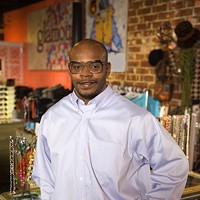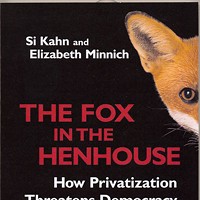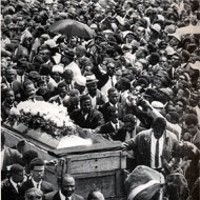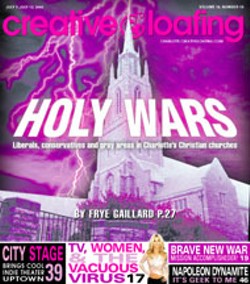Page 2 of 8
The most flamboyant of the group was Owens, a silver-haired theologian, born in eastern North Carolina, a man who gradually developed over time a poetic affinity for the well-spoken word. He seemed to revel in shaking up the flock. He marched for busing to integrate the schools, and called for peace in Vietnam, and invited Carter Heyward, an Episcopal priest who had recently acknowledged to the world that she was gay, to preach from the pulpit at Myers Park Baptist.
A few miles away at Covenant Presbyterian, Doug Oldenburg was a quieter presence, but no less firm. He was a handsome man with soft, gentle eyes, and he was caught, he said, "in a lover's quarrel" with the capitalist system. On many a Sunday during his time at Covenant, he proclaimed to the influential people in the pews that the church had a special mission for the poor. Part of it was simply a matter of compassion, like giving to the Crisis Assistance Ministry or helping build houses for Habitat for Humanity. But at least as important in Oldenburg's view was the church's obligation to roll up its sleeves and represent the poor in the halls of government.
The Bible, he thought, was full of those commands, inconvenient reminders for people who wanted to enjoy their own wealth. But if you took them seriously, the sermons of Jesus and the lessons of the prophets were a powerful force to make the world more just. That at least was Oldenburg's view, and like the others in the Myers Park pulpits, he was not afraid to lay it on the line.
Dale Mullennix remembers those days. He came to Charlotte in 1979 as an assistant minister at Myers Park Baptist. He was fresh out of seminary in Louisville, and was embarked on a personal mission at the time "to save the world for the left." He was astonished by the message from the Myers Park ministers, these graceful, intelligent voices of compassion, and he was surprised also by the gradual discovery that the more he got to know these men, the more impressive they seemed.
"They used to get together for breakfast once a month," he remembers, "and I'd finagle a reason to be invited, just for the quality and depth of conversation. There was not a word of competitiveness among them. They were asking instead, what is good for the community? What is right? What will work? There was seldom any talk about parking problems, and the old idea that the church should lower its voice to raise its income just never came up."
But what about now? Is Bill James correct? Have the powerful liberal voices disappeared? The simplest answer to that question is no. At Myers Park Baptist, the current minister Steve Shoemaker is not as colorful, certainly, as Owens. But there are few, if any, who fault his courage, or the depth and intelligence of his Sunday morning sermons.
Shoemaker spent his teenage years in Charlotte before going away to seminary and then to other pulpits in other parts of the country. He came back home after serving at an inner city church in Houston. He enjoyed it there, enjoyed the location in the heart of downtown, where he could urge the homeless people in the streets not only to come in for handouts of food, but to join the church and participate fully in everything it did -- the Sunday morning worship, the family dinners, even the missions to the people in need.
He knew that Myers Park was a different kind of place. It was nestled away in one of Charlotte's oldest neighborhoods, an area of handsome, two-story homes, where the wind rustled gently through the magnolia leaves. The church had always struggled against the elegant isolation of its setting, but Shoemaker knew that his predecessors, Marney and Owens, had encouraged the congregation to be involved in the community, and to wrestle with the ethical issues of the day.
Shoemaker was happy for the chance to do the same. Late in the fall of 2002, with the country in the looming shadow of a war, he decided to preach a sermon about Iraq. He talked about the teachings of Jesus, that troubling pronouncement about loving your enemies, and he talked about the practical tendency of the world to ignore a command so completely inconvenient.
"We kneel," he said, "before the mystery of God and the terrors of life, in bafflement and moral anguish. We pray for our President and our nation's leaders, and we pray for the leaders of all nations and peoples. And we pray for our enemies, though our hearts recoil -- how could they not recoil? For Saddam Hussein and all who would do us harm. We pray for our soldiers and for the people of Iraq and Afghanistan, and for a world which seems never to know the things that make for peace. Amen."
Speaking of News_.html, 5.00000
-
A Family Affair
Dec 12, 2007 -

Darrell Roach
Dec 12, 2007 -
Body Talk
Dec 12, 2007 - More »
Latest in Cover
More by Frye Gaillard
-

Efficiently Careless
Nov 2, 2005 -

Where The Action Was
Jun 1, 2005 -

Curtis Turner, A Great Driver
Mar 23, 2005 - More »
Calendar
-

NEW WINDOW GALLERY-Pat Rhea-ACRYLIC PAINTINGS-April 05-30 2024 VALDESE, NC 28690 @ New Window Gallery/Play It Again Records
- Through April 30, 12 p.m.
-

TheDiscountCodes
-

"Blood Residue Analysis of Paleoamerican Stone Tools in the Carolinas" @ Native American Studies Center
- Fri., April 26, 12-1 p.m.
-

Brightfire Music and Arts Festival @ GreenLife Family Farms
-

ARTS RENAISSANCE, a GALA supporting the ARTS in South Carolina @ the Columbia Museum of ART
-
Let your Fingers do the Shopping
Weird, wonderful and just plain useless gifts
-
WINE TO WATER: Keeping Up With The Global Water Crisis 1
NC Water Charity Saving Lives
-
The 10 Scariest People In Charlotte 1










